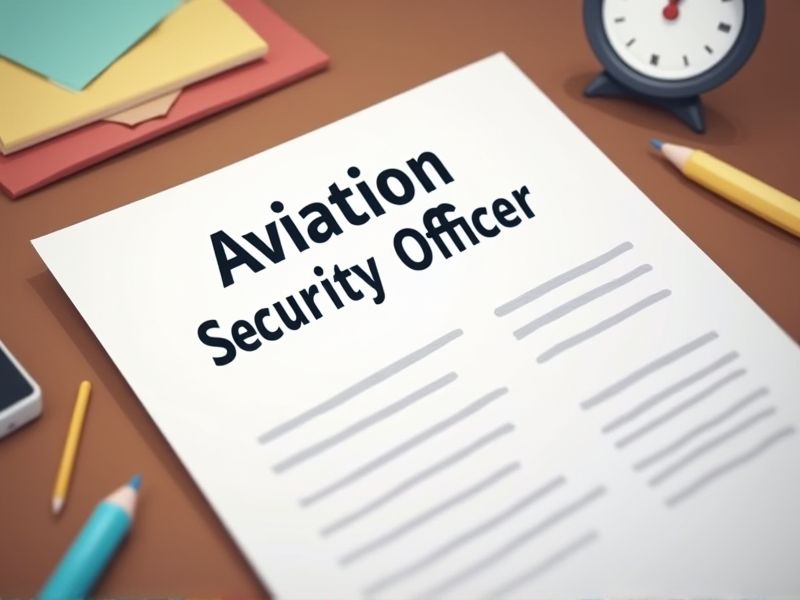
The role of an Aviation Security Officer involves ensuring the safety and security of passengers, crew, and aircraft, which requires specialized skills and knowledge. Certifications are necessary to meet international and national aviation security standards, understanding emerging threats, and mastering various security technologies. These certifications also facilitate effective crisis management and adherence to legal regulations during complex scenarios. Below are critical certifications essential for an Aviation Security Officer.
IATA Aviation Security Awareness Training
IATA Aviation Security Awareness Training equips aviation security officers with essential knowledge to identify and mitigate potential threats. This training enhances the ability to recognize suspicious behavior and items, reducing the risk of security breaches. Officers gain a comprehensive understanding of international security protocols, ensuring compliance with global standards. Ongoing training updates skills to match evolving threats in aviation security.
IATA Aviation Security Fundamentals Certification
The IATA Aviation Security Fundamentals Certification provides a standardized understanding of global aviation security measures, essential for Aviation Security Officers to effectively manage threats. With rising security concerns, officers equipped with this certification are better prepared to implement international best practices and enhance safety measures. Airlines and airports prioritize employing individuals with this certification to ensure compliance with global security regulations. Holding this certification often leads to improved career opportunities and professional credibility within the aviation security industry.
TSA Certified Aviation Security Specialist
A TSA Certified Aviation Security Specialist is essential because they possess advanced training that equips them to identify and respond to evolving security threats within the aviation sector. Their specialized knowledge enhances the overall efficiency and effectiveness of security procedures at airports. Employing these certified specialists drives compliance with federal regulations and standards, ensuring passenger safety. Their expertise also aids in minimizing delays and disruptions caused by potential security threats, contributing to smoother airport operations.
ICAO Aviation Security Regulation Compliance Certification
ICAO Aviation Security Regulation Compliance Certification ensures that Aviation Security Officers are trained according to international safety standards, minimizing the risk of security breaches. Meeting these regulations enhances the credibility and reliability of aviation security operations, fostering trust among passengers and stakeholders. Certification provides officers with the necessary skills to identify and address potential threats effectively, improving overall airport security. Countries adhering to ICAO standards facilitate smoother international travel and cooperation by maintaining consistent security practices globally.
Airport Security Operations Certification
Certification ensures Aviation Security Officers have a thorough understanding of protocols and procedures, which is crucial for maintaining safety. It provides standardized training, leading to consistency in security measures across different airports. This formal recognition enhances credibility and trust from passengers and staff. Certification also ensures officers are up-to-date with evolving threats and technologies in aviation security.
Certified Protection Professional (CPP)
Aviation Security Officers enhance their credibility and earning potential by obtaining the Certified Protection Professional (CPP) certification. The CPP credential ensures that security officers possess comprehensive knowledge of security management, which is crucial for addressing complex threats in the aviation sector. The certification signifies a commitment to the highest standards of security practices, thus boosting stakeholder confidence. As aviation is a high-risk industry, CPP-certified individuals contribute to maintaining stringent security measures and protecting both passengers and assets.
Certified Aviation Manager (CAM)
Certified Aviation Manager (CAM) certification enhances an Aviation Security Officer's understanding of complex aviation operations, improving decision-making capabilities. The comprehensive knowledge gained through CAM leads to better management of security protocols and emergency scenarios. CAM certification aligns security strategies with industry standards, reducing risk and ensuring efficient regulatory compliance. A CAM-equipped officer is more adept at integrating security measures with overall aviation business practices, leading to streamlined operations and improved safety.
Security Risk Management Certification
Aviation security officers face complex and evolving threats; the Security Risk Management Certification equips them with the necessary skills to identify and mitigate these risks effectively. The certification provides a structured framework for understanding potential vulnerabilities in the aviation sector. In acquiring this certification, officers enhance their ability to implement strategic risk management practices, thereby safeguarding passenger safety. Regulatory bodies increasingly demand certified professionals, prioritizing security measures that align with international standards.
Emergency Response and Preparedness Certification
Emergency Response and Preparedness Certification equips Aviation Security Officers with the skills to handle crises effectively, which reduces the risk of harm to passengers and crew during emergencies. This certification ensures officers are knowledgeable about various protocols, enhancing the overall safety and security operations within airports. Trained officers respond more efficiently during incidents, lowering potential disruptions and maintaining airport functionality. Certification demonstrates compliance with international aviation safety standards, boosting trust among airlines and passengers.
Critical Infrastructure Protection (CIP) Certification
The CIP Certification enhances an Aviation Security Officer's ability to identify and mitigate potential threats to critical aviation infrastructure. Rigorous training associated with the certification ensures that officers are well-versed in the latest security protocols and technological advancements. With the growing complexity of cyber threats, CIP Certification equips officers with the necessary skills to safeguard against digital attacks targeting aviation systems. By having certified personnel, aviation facilities demonstrate their commitment to maintaining the highest security standards, thus strengthening public confidence in air travel safety.
Summary
When you obtain certifications as an Aviation Security Officer, you enhance your skills and increase your employability within the industry. Employers often view certified professionals as more knowledgeable and capable, which can lead to higher career advancement opportunities. Certified officers typically experience increased job satisfaction due to their specialized skills and recognition. Certifications also equip you to handle complex security scenarios more effectively, ensuring better operational efficiency.
